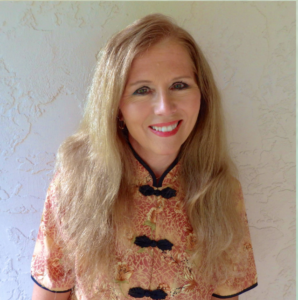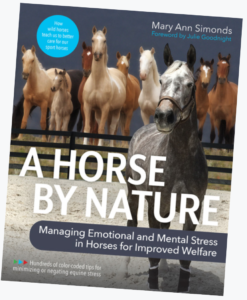Our show is a space for riders and horse owners of all disciplines to learn best practices and to discover skills, strategies, tools, ideas, and insights for better connecting with their horses, with all horses and for getting work done.
We love to hear from listeners, we think this might be an episode that fosters a lot of conversation, and contacting us is easy through the contact button on best horse practices dot com.

Mary Ann Simonds
We offer these shows for free. If you think it’s worthy of a small contribution, we sure would appreciate it.
This is Episode 16 of Season 4 and in it, Jec interviews author Mary Ann Simonds. This is a good one because I am at odds with some of what they talk about, which is a good thing. I love that we can have folks on the show that Jec embraces and I don’t. Or vice versa.
Mary Ann has spent years studying horse behavior and horse-human interaction in competitive show barns and has worked with many clinicians. So, I understand that she comes from a very different world than me.
I think it’s important to steer clear of language that attempts to give horses human inclinations. She says, for instance, that horses like to create drama and that horses can be on the autism spectrum. Those are anthropomorphic assessments that give me pause.
Mary Ann talks about love and care for our horses as if that were a clear idea. Love and care for someone who keeps her horse in a stall at a boarding facility looks a lot different than how a Wyoming rancher may consider love and care.
Thanks to our title sponsor, Lucerne Farms, producers of quality forage feeds, extremely handy and healthy bales of alfalfa, timothy, and grass blends. A great addition or substitute for your hay or grass and way better than grain.
We thank Sampson Moss and his business, Prairie Wind Hat Works for the generous sponsorship. Sampson makes custom hats from his place in Pincher Creek, Alberta. Order yours and have it for the spring riding season. You will look sharp!
 Considering love and care and how we make progress with our horses. Wow, what a tough subject.
Considering love and care and how we make progress with our horses. Wow, what a tough subject.
Just like the greater American social world, I can here all kinds of judgment from the recreational or sport community towards the working community or from suburban to rural, from dressage to rodeo on what it means to love, care and make progress with our horses. Years ago, I ran a business taking care of other people’s horses in Maine. I was taking care of a woman’s horses for a week and she apologized for practicing what she called “affectionate neglect.” She felt a bit ashamed that her horse routine was so simple. They had the run of the pasture. They were together. They didn’t get blankets or stalls or grain. They basically had space and were kept together. My response was, “this is terrific! what are you ashamed of?”
Temple Grandin, who has come in and out of fashion over her many years, has been extremely helpful to me. Language, she has said, can get in the way. Even the word “humane” means different things to different people. The assessments that Mary Ann is developing for horses’ mental health will be interesting to learn more about.
Thanks to Redmond Equine and Pharm Aloe – for generously sponsoring our podcast. Check out Pharm Aloe’s aloe pellets which you can simply sprinkle on your horse’s feed and Redmond’s Rock on a Rope which you can simply hang on a fence. We think you’ll love ‘em.
Also thanks to Patagonia WorkWear for their continued support. Give us feedback, suggest a topic or guest, or make a donation and you’ll be automatically entered to win one of two free Patagonia WorkWear items that we give away every month. Don’t forget that Redmond Equine is sending a complimentary syringe of Daily Gold Stress Relief to everyone who drops a tip in our donation jar. Pretty cool and a $15 value. If you get something of value from our podcast, please consider making a donation. We sure would appreciate it.
That’s it. Another episode in the can and out of the barn. Thanks for listening, y’all.